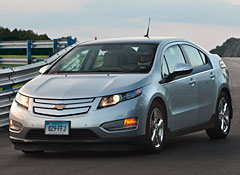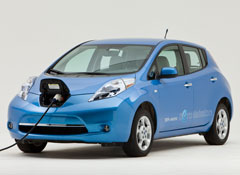
Our electric test cars offer lessons in depreciation for early adopters.
Plug-in cars were supposed to be the next big thing. But once they're a year old, it turns out they're just used cars--and used cars with far worse depreciation than average.
That's what we're finding as we try to sell the Chevrolet Volt and the Nissan Leaf that we bought to test last year.
A bit of background: We buy all the cars we test at retail from dealers just like you would. And we buy them anonymously. That way we can ensure we get a car representative of those consumers can buy, not one that's been specially prepared by an automaker or dealership. Since we want to inform readers about them as soon as possible, we try to buy them as soon as they go on sale. We're often asked what happens to the cars we test after we're finished testing them. The answer: We sell them, usually to employees or friends, and sometimes, when we get no interest among those groups, we trade them back in to dealers on the next batch of test cars.
That's where we are with our Volt and our Leaf.
With no staff or friends stepping up to buy our early Nissan Leaf, we began asking dealers for bids on it last week. The best offer we received from a local dealer was $16,500. When we bought our high trim-level Leaf SL with its optional DC "fast-charge" port in California in April 2011, we paid $35,998, representing a small markup over the $35,430 sticker. It's not that unusual for us to pay additional dealer markup to buy early examples of newsworthy cars so that we can let readers know how they perform while they're still of interest in the marketplace. Such is the price of being early adopters.

So our 20-month-old Leaf has lost almost 60 percent of what we paid for it, which no amount of savings on fuel and maintenance can make up for. (And on top of that, we paid to have it shipped to our test track in Connecticut, since it was only sold in California when we bought it. We couldn't drive it here!) That threatens to blow our budget of approximately $700,000 we spend on test cars every year.
Granted, this is an egregious example. Most buyers today don't pay additional dealer markup. And electric-car buyers get a $7,500 federal tax credit at the end of the year to offset the price. As a non-profit organization, we don't get the tax credit, but effectively have to pass it on to the second owner since that's what the market value of other Leafs reflects. Even counting the tax credit and assuming we paid sticker, however, our Leaf has suffered 41 percent depreciation in less than two years.
The average car depreciates between 30 and 35 percent in that time frame. The difference reflects the limited market for a car with an 80-mile range that takes more than seven hours to recharge--and the fact that a buyer will have to fork out another couple grand to install a Level 2 charger at home to charge it even that quickly. It also reflects the risk of a new technology. While the Leaf has very low maintenance costs, the jury is very much out on the long range durability of its expensive battery pack, rumored to cost Nissan as much as $16,000 today. (That's what Nissan means when it says it expects the battery to last the life of the car!)
With our Volt plug-in hybrid, the picture is not so clear. We bought our Volt on Dec. 20, 2010. Our car, with heated leather seats, a backup camera, and 17-inch aluminum wheels (and a navigation system, which was standard at the time), stickered for $43,700. We paid an extra $5,325 dealer markup for a grand total of $49,025. Now, two years later, another dealer is offering us $23,000.
Factoring out the tax credit and the dealer markup, however, the Volt's depreciation hits 36.5 percent over our full two years of ownership. That puts it right about average among all two-year-old used cars. This reflects the wider market for the Volt, and its lower-than-average running costs, as well as the additional risk of someday having to replace its batteries, which are about 60 percent the size of the Leaf's.
In both cases, online buyers guides value the cars a little higher, though not so much that their depreciation doesn't stand out.
In the end, these cars help pinpoint the cost of being an early adopter. With technology this new, one thing is clear when you start thinking about buying a plug-in car: Upcoming models will be more capable, and these cars will quickly become obsolete. Both the Volt and the Leaf are offered with great lease deals. And while we don't normally recommend leasing, it makes sense here: You get the benefits of new technology without taking on the risks.
Unfortunately, we can't lease cars anonymously, so we have to buy them. And we don't qualify for tax credits. So we'll just have to negotiate to get the most value out of our trade-ins.
Anybody want to beat $16,000 for a 2011 Leaf? How about $24,000 for a gently used 2010 Volt? Anybody?





